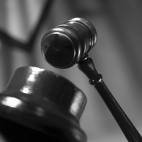The plaintiff had, on several occasions, requested that the trial judge recuse from the case on the basis of "bias." The trial judge refused. While the plaintiff pursued several remedies related to the recusal issue, the trial court entered a default judgment against the plaintiff. The plaintiff later attempted to have the judgment vacated in light of the pending recusal proceedings, but the trial judge denied his request.
HELD: The trial court erred in continuing to entertain proceedings during the pendency of the disqualification process. "When a Rule 15 proceeding to seek disqualification of a trial judge is initiated, the trial court must refrain from presiding over the case until the disqualification ruling is memorialized and the movant has, at the movant's option, exhausted the Rule 15 procedure." In fact, the trial court has no discretion in this regard; it must refrain from further participation, lest a party's right to due process of law be violated.
The Court also held that the trial court abused its discretion in refusing to disqualify on the basis of "bias." The Court cited certain dialogue between the trial judge and the plaintiff, and held that "although the trial court may have believed himself to be unprejudiced, unbiased and impartial, circumstances . . are of such a nature at to cause doubts as to the impartiality. . . [E]rror, if any, should be made in favor of disqualification."
Opinion
HELD: The trial court erred in continuing to entertain proceedings during the pendency of the disqualification process. "When a Rule 15 proceeding to seek disqualification of a trial judge is initiated, the trial court must refrain from presiding over the case until the disqualification ruling is memorialized and the movant has, at the movant's option, exhausted the Rule 15 procedure." In fact, the trial court has no discretion in this regard; it must refrain from further participation, lest a party's right to due process of law be violated.
The Court also held that the trial court abused its discretion in refusing to disqualify on the basis of "bias." The Court cited certain dialogue between the trial judge and the plaintiff, and held that "although the trial court may have believed himself to be unprejudiced, unbiased and impartial, circumstances . . are of such a nature at to cause doubts as to the impartiality. . . [E]rror, if any, should be made in favor of disqualification."
Opinion

No comments:
Post a Comment